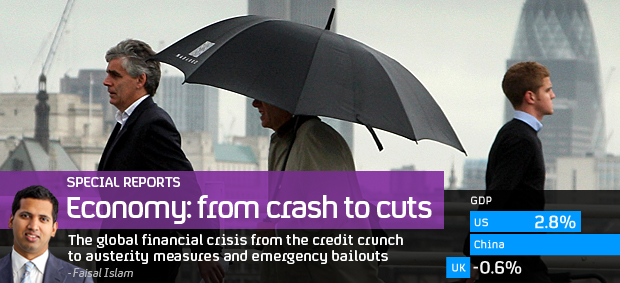Indebted Greece vows to live up to obligations
Greek Prime Minister George Papandreou says he will do what is necessary to deal with his country’s economic crisis, which is threatening to spill over into other European states.
During a visit to Berlin for talks with Chancellor Angela Merkel, Mr Papandreou tried to reassure other European countries and the nervous financial markets that action was being taken to deal with Greece’s debts.
“I can guarantee that Greece will live up to all its commitments. I promise you we Greeks will soon fight our way back to growth and prosperity after this period of pain,” he said in a speech to business leaders.
European shares rose amid hopes that a rescue package is being put together to stop the crisis in Greece from spreading to other countries, threatening the single currency and creating the conditions for a second “credit crunch”.
‘Scaring the world’
With US President Barack Obama warning that eurozone debt turmoil is “scaring the world”, the Greek parliament votes today on a new property tax that has caused outrage among the middle classes.
It is part of a package of measures designed to cut Greece’s deficit that will be used to convince the International Monetary Fund (IMF) and the European Union that Athens is doing everything it can to balance the books.
I promise you we Greeks will soon fight our way back to growth and prosperity. Greek Prime Minister George Papandreou
Inspectors arrive in Greece on Wednesday to discuss whether to release the latest tranche of bailout funds, having suspended an earlier visit because of concerns that Athens was not doing enough to tackle the hole in its public finances.
President Obama made it clear that America wanted to see Europe act more quickly to prevent Greece’s problems from endangering the economies of other countries.
“They are trying to take responsible actions, but those actions haven’t been quite as quick as they need to be,” he said.
Stopping a Greek drama from becoming an economic tragedy
What happens if Europe's politicians fail to resolve Greece's debt problems? Channel 4 News asks the experts
Debt write-off
Pressure is also coming from advisers to the French and German governments, who say in an article in Financial Times Deutschland that Greece should be allowed to write off half of its debt, with more financial given to banks with large holdings of Greek bonds.
They say: “It is indispensable to improve co-operation in the eurozone and develop possibilities to break the vicious circle of bank and debt crisis, and guarantee competitiveness and growth. Until then, we should be agreed on putting out the fire as quickly as possible.”

With bailouts already agreed for Ireland, Portugal and Greece, there are fears that the crisis could spread to Spain and Italy. At weekend talks in Washington, attended by officials from the IMF and World Bank and G20 finance ministers, several options emerged as possible solutions.
They are: a 50 per cent writedown of Greece’s debts; increasing the amount of money in Europe’s bailout fund, the European Financial Stability Facility (EFSF); and the recapitalisation of Europe’s banks.
German vote and Greek protests
Germany’s parliament votes on Thursday on extending the powers of the EFSF, but Berlin is opposed to proposals to increase its size from 440bn euros (£384bn) to about 2tr euros (£1.7tr).
Ms Merkel is trying to persuade some critics in her own party to support an extension. They are reluctant to see Germany shouldering other countries’ financial burdens. The government will carry the vote because the opposition parties are in favour, but these parties have said Ms Merkel should call an early election if she fails to secure a majority from her own ranks. In Berlin, Mr Papandreou said the EFSF should be expanded.
Greece has been beset by protests as it it tries to push through its austerity programme of tax increases and public sector cuts. The government is putting 30,000 public sector workers on notice, cutting their pay by 60 per cent and giving them a year to find new work in the state sector or face the sack. The two biggest unions in the country, representing about half of Greece’s workforce, are planning two 24-hour strikes in October.
-
Latest news
-
‘I violated my moral compass working for Trump,’ former lawyer testifies3m

-
Working class creatives in film and TV at lowest level in decade5m

-
Israeli police investigating attack on Gaza aid convoy4m

-
Biden announces major tariff increase on Chinese-imported green tech3m

-
‘If NHS can afford it, people with obesity should have Semaglutide,’ says weight loss expert5m

-




